BristolCon 2018 – Convention Report
BristolCon will celebrate its 10th anniversary next year, although I first heard about the event only five years ago, in the article accompanying this picture on Mark Lawrence’s October 2013 blogspot.
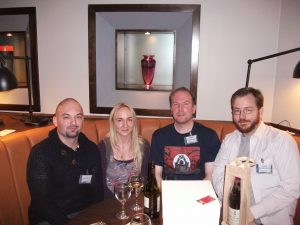
(Luke Scull, Agnes M, Mark Lawrence, Snorri Kristjansson)
I was enthralled at this evidence that there were events where famous authors proved themselves to be not just ordinary people (they liked cake) but also accessible to the general public/readership – provided, that is, you could get to the Hilton Doubletree in Bristol.
I didn’t make it to the convention myself until 2015, but 2018 saw my fourth consecutive attendance (here’s my report from last year’s event). This year the date clashed with the London-based Comic Con, which put some authors on the horns of a dilemma. However, BristolCon was still graced with many excellent writers and contributors who eschewed the comfortable convenience of London in favour of the extremities of the M4 and/or the great western railway.
The Congeniality
The convention deserves its reputation as ‘the friendly con’. This may owe much to hosting it in a hotel, which allows many visitors and contributors to stay onsite. This year the gathering of the clans (like some fantasy version of Outlander or Brave) began early with Alicia Wanstall-Burke flying in all the way from Australia (surely the con’s most travelled guest ever), arriving in Bristol on Wednesday.
Other convention goers arrived through Thursday (to enjoy Bristol sights and scenery):
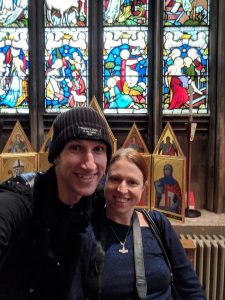
Tom and Rita enjoying St Mary at Redcliffe
More arrivals accrued on into Friday afternoon, until the bar at the Hilton was buzzing with chatter.
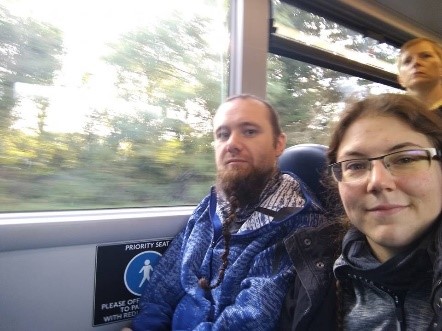
Andreas and Julia on the bus.
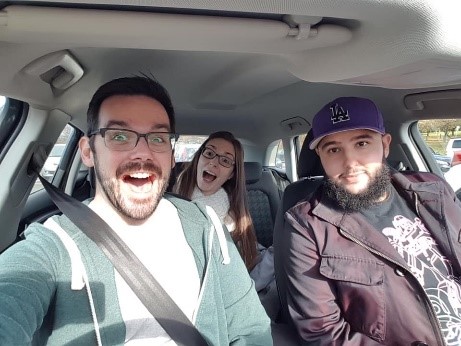
Colin, Laura and Sadir in the car

Kareem and Anna on song
A year or more of keyboard-messaging fellow fans and writers surrendered to actual face to face conversations. The exchange of gifs and emoticons gave way to buying rounds of hard (and soft) liquor.
By Friday evening, hunger gripped the throng and we ventured into Bristol in a vain search for an establishment that could take an unbooked party of 28 at 7.00 pm on a Friday night. The plan – if I can call it that – being driven not so much by a hive mind as a collective stomach was doomed from the outset. In keeping with our current political environment, it seemed we were headed for a No-Meal exit.
However, Kareem Mahfouz and Steve McHugh adopted a strategy reminiscent of Gandalf plying Beorn with a sequence of dwarves at the last friendly house. A restaurant that could not possibly have space for 28 diners nonetheless could find room for ten and then another ten and then eight – though by then some of us had already skulked off to other establishments.
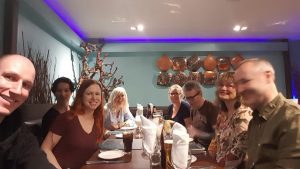
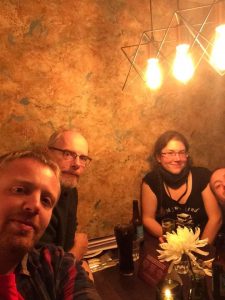
Eventually fed, we returned to the hotel bar, and – between drinks – scanned the programme for events to attend the following day.
The Convention
Panels and readings filled two rooms throughout the day, while an art room, a market space and a workshop space took up the rest of the venue. To give you a flavour, I:
- Listened to Graham Austin-King reading an excerpt from his soon-to-be-released new book “The Lore of Prometheus”; a conversation heavy with foreboding as two prisoners try to succour one another despite the harrowing experimentation that one has already endured and the other may yet experience. (You can hear it here.)
- Attended a panel on writing the nonhuman, moderated by Su Haddrell. The panellists challenged the genre’s tendency to make our nonhumans just humans in pretty costumes, and offered a variety of alternative lifeforms and concepts of sentient life from their own printed and developing work. I was particularly struck by Cheryl Morgan’s query as to why writers/illustrators might portray a reptilian species with breasts, which are after all a definitive mammalian trait. Having explored some backstories that might explain the bizarre form of his five-limbed starship engineer, Gareth L. Powell drew that discussion to a close by observing “World building is like sex, it can be quite fun but not many people want to watch you doing it.”
- Met up in Maldovar Market with Sammy H.K. Smith and Joel Cornah of Grimbold Books, one of many small press publishers with an impressive array of books on display. Grimbold was awarded Best Independent Press in 2017 by the British Fantasy Society and they charmed me into buying 4 books, two of which I have now finished less than a week later!
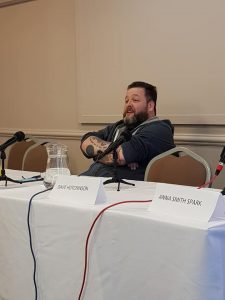

The Conversations
A few yards from BristolCon, ‘BarCon’ continued in full flood. Learning perhaps from previous years, the hotel staff had prepped a range of pre-packaged bar snacks/baguettes to complement their normal bar food – a testament to how busy the day was.
First-timers and old hands alternated attending formal panels and readings with the chance to enjoy the company of an extended community and an extended evening. At times the bar may have been a little loud for easy conversation, and there may have been the odd disagreement about the merits of this book or that book, but on the whole it was an amiable gathering that lasted (with steadily decreasing membership) into the small hours of the morning.
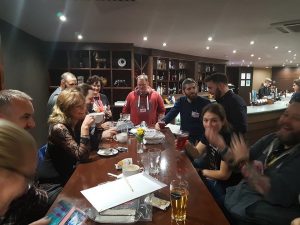
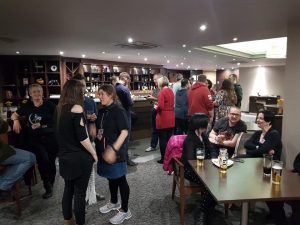
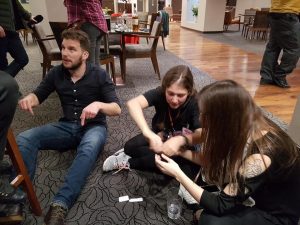
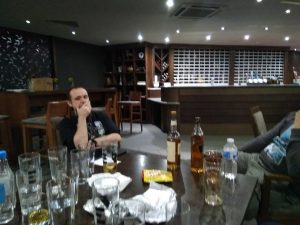
Over the course of the convention I learned about R.B. Watkinson’s foray into the world of narrating audiobooks – beginning with her much acclaimed rendition of Michael R Fletcher’s Ghosts of Tomorrow. Besides useful tips on equipment and technique, conversation touched on the subject of “does listening to an audiobook count as having read the book?” The consensus was yes – particularly from those with long work journeys where audiobooks made a virtuous opportunity out of a travel necessity.
I talked with Anna Stephens about starting second trilogies and also the angst that can strike writers seeking to embrace diversity and yet delving beyond their own direct experience, making sure we achieve representation without appearing to commit appropriation. I remembered at BristolCon 2017, Tom Clews thanking Anna Smith-Spark for her seamlessly incorporating gay characters in The Court of Broken Knives. We agreed the issue had two elements:
- one of representing diversity through having a diverse cast of visible characters within your story (e.g. in Elizabeth Bear’s Karen Memory)
- the other of depicting the kind of disadvantage and discrimination that – in our world – comes with difference and institutionalised disparity of access to power (e.g. in Zen Cho’s Sorcerer to the Crown).
Fantasy authors with little or no experience of that disadvantage must tread with care and respect, but tread there we should.
When I spoke later to Mark Lawrence he thought that publishers can be wary of writers who take too overt a political stance, who make their villains too transparent an analogue for this or that contemporary politician. But fantasy authors are a cunning lot. Our stories must entertain, that is their function first and foremost, but in the manner of fables they may say something meaningful about our own world as well as a lot more about the world of the author’s imagination.
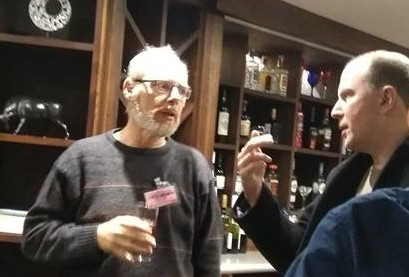
T.O Munro and Mark Lawrence
I also asked Mark about the characteristics of young adult books, having glimpsed The Court of Broken Knives surely misplaced on the YA bookshelves of a Derry bookstore. What defines young adult, given that a high proportion of YA veers into the speculative fiction realm? (I was thinking of for example The Coldest Girl in Coldtown by Holly Black, a vampire story, and The Smoke Thieves by Sally Green, which has elements of high fantasy).
Mark answered that key features include YA having a young female protagonist and an element of romance – which fits with my limited experience of the genre. This means of course that my entire Bloodline trilogy (starting with Lady of the Helm) could be classed as YA (you have to wait a bit for the romance, mind – too much hacking and slaying first of all). I shall sit back and wait for the floodgates of readership to open. 🙂
Meanwhile, in other parts of the room:
- Kareem followed up 2017’s dire account of ‘frosting’ with a story about batwings which none of the men there were willing to corroborate. You will have to ask the man himself for more details.
- Marielle hatched a project for a collaborative book with Adrian Selby, a kind of authorial game of fantasy consequences where fantasy writers scribe successive chapters of a common story fashioned on a very slender initial theme. Get your pre-orders in now.
- Alicia Wanstall-Burke launched her accomplished debut novel, Blood of Heirs, to much acclaim and celebration.
- Agnes hovered catching photos for the inevitable That Thorn Guy caption competition – apparently I didn’t duck fast enough.
- Andreas and Colin vied for the title of most understanding/involved partner of a fantasy-driven other half. Most of us had left wives/husbands/children at home. Experience has shown some that a sci-fi/fantasy collective can be a less appealing experience if you have only one fantasy book that you have read enough to talk about and your partner is eager to catch up with people they haven’t seen in months. However, like the stories themselves, conventions are people-driven affairs that can be fun on several levels. The talk wasn’t always of fantasy, but often of work and family and life in general.
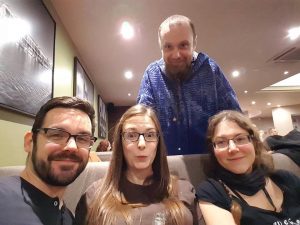
Colin and Laura, Andreas and Julia
And hundreds of other conversations ebbed and flowed around the bar as friendships formed, or grew, or were renewed.
The timing of BristolCon – a few days before the Gaelic festival of Samhain, with winter’s grip tightening in darker nights and colder days – seems to accentuate its sense of community and celebration.
Certainly the Wikipedia description of Samhain – “…it was marked by great gatherings where they held meetings, feasted, drank alcohol and held contests” – is a pretty good fit for Bristolcon.

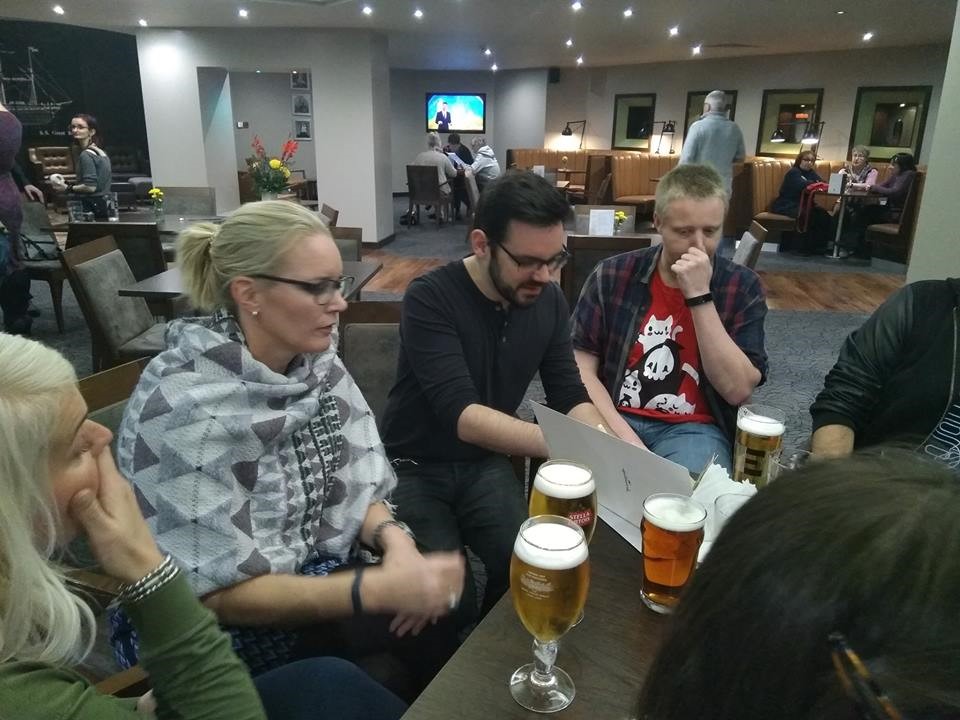
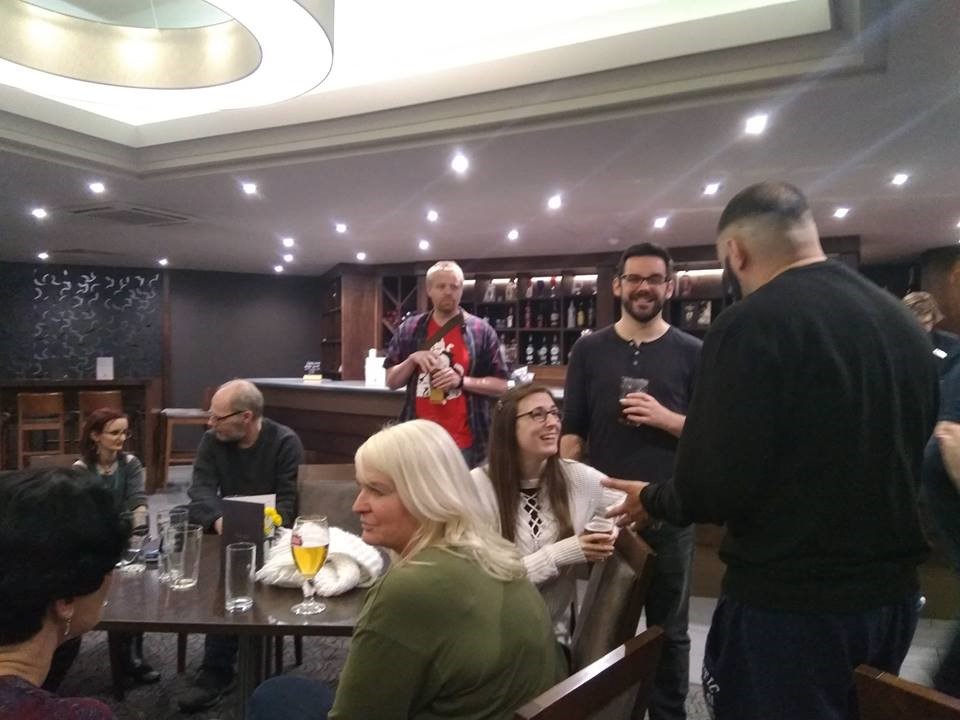
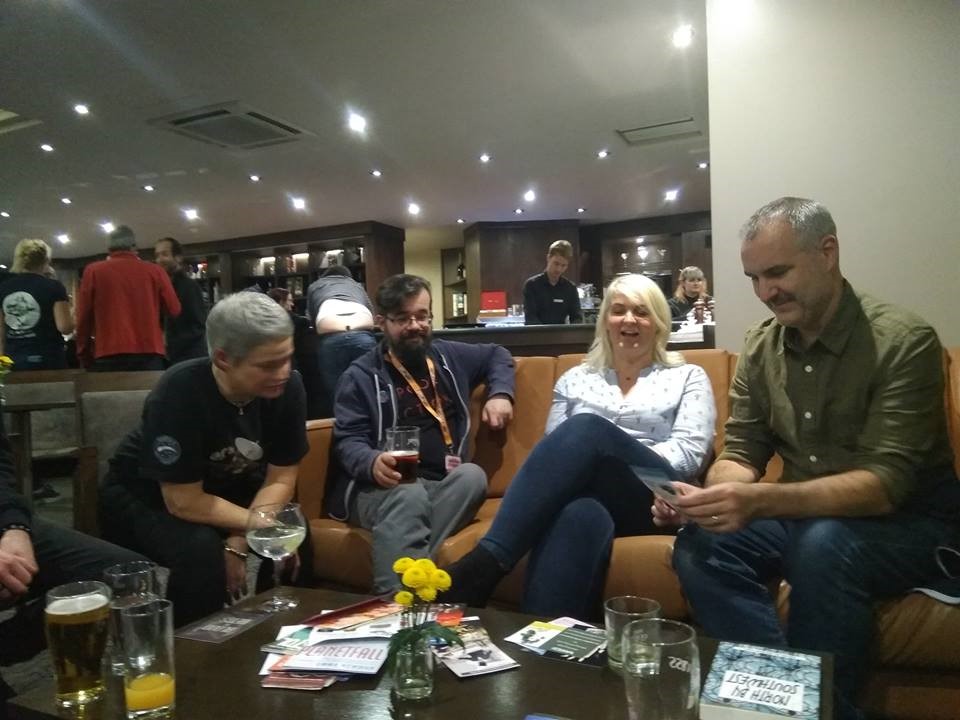
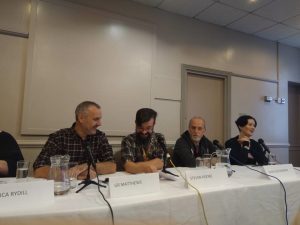
Good times.
You bastards had waaaaaaaaaaaaaaay too much fun! 🙂
It’s true. We did. ;D
See you next year??
Bit off the beaten track for me alas but expecting to see you in Wellington for the World Con!? 🙂
Possibly… possibly!